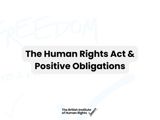Public service duties
What duties do public bodies and service providers have?
Our Human Rights Act contains 16 fundamental rights. These come from the European Convention on Human Rights, and our Human Rights Act puts them into UK law. Although some rights (known as non-absolute rights) can sometimes be limited or restricted, rights cannot be taken away.
Under our Human Rights Act, public bodies and service providers have a legal duty to respect, protect and fulfil human rights across their actions, decisions, policies and services.
Our work with public services Human rights training for public bodies
What does ‘public authority’ mean?
The definition of “public authority” under the Human Rights Act (HRA) includes:
- core public bodies i.e. organisations formally established and publicly funded to deliver a state service, like the NHS or police forces; and
- “any person certain of whose functions are functions of a public nature”. This is what’s known as a “hybrid public body” and can include organisations such as private companies and charities contracted by the State.
This means a body doesn’t need to be a traditional public body to have legal duties under the HRA. The emphasis is on the nature of the service being delivered (is it “generally expected to be performed directly or indirectly by the State”?) and not the nature of the body delivering it.
What duties do public bodies and service providers have?
Section 6 of the HRA says “it is unlawful for a public authority [also known as a “public body”] to act in a way which is incompatible with a Convention right”. This means one of the 16 rights from the European Convention on Human Rights which is put into UK law by our Human Rights Act.
The duty to act in a way that supports human rights has three parts: respect, protect, and fulfil.
These duties apply to all the rights in the HRA. The public authorities that we work with tell us that they do not see these duties as a burden, but rather as an important tool to help them make rights-respecting decisions.
DSD and NBV's story
In 2018, the Supreme Court ruled that the police owed human rights damages to two victims of John Worboys - the black cab driver responsible for a large number of sexual offences. DSD and NBV (they asked to remain anonymous) reported to the police that they had been sexually assaulted in 2003 and 2007.
Due to what the court said were significant errors, officers failed to charge the London black-cab driver at that stage. Worboys went on the assault as many as 100 more women.
Our Supreme Court (the top court in the UK) found the police, as a public body, accountable under the HRA. This means that even when crimes are committed by a private citizen, the state can still be held to account. In this case, the police for failing to undertake a proper investigation which left the woman exposed to inhuman and degrading treatment.
Read about this case in our human rights advocacy tool for women survivors of domestic abuse
The Human Rights Act and other laws
Section 3 of the HRA means that governments, public bodies, and service providers must apply other laws and policies in a way that upholds our rights so far as possible. When this doesn't happen, individuals can seek justice in the courts. Whilst courts can never overrule an Act of Parliament, where possible they can apply other laws compatibly with human rights. This is a key form of accountability that makes us all stronger in a healthy democracy.
Public bodies and service providers should, as far as possible, see the HRA as the foundation of how they make decisions using other laws. This includes laws about a range of issues such as discrimination, protest, mental health, welfare, and migration.
The HRA should also be the foundation of how public bodies and service providers write and apply regulations, guidance such as codes of practice, and their own internal policies and decision-making processes.
What happens if governments, public bodies, and service providers don’t meet their duties?
If a government, public body, or service provider has breached someone’s human rights, the HRA means that person can bring a legal case in a UK court or tribunal. If the court finds that human rights have been breached, the person(s) whose rights have been violated are entitled to an effective remedy – this means a way of putting things right. The remedies will depend on the situation, and can include the public authority paying damages to the person, or being ordered to do something.
If someone is worried that a public body or service provider may not be considering human rights, there are steps they could take to raise a human rights issue to try and resolve the situation without needing to get a lawyer or go to court.
The 16 Rights
What Rights Do I Have?
Our Human Rights Act takes 16 of the fundamental human rights written into the European Convention on Human Rights and puts them into UK law. This means they can be enforced in UK courts rather than having to go the European Court on Human Rights in Strasbourg.
Related information
Stay up-to-date
Get our newsletter
Get monthly updates on UK human rights law and our work, resources and events sent straight to your inbox.









